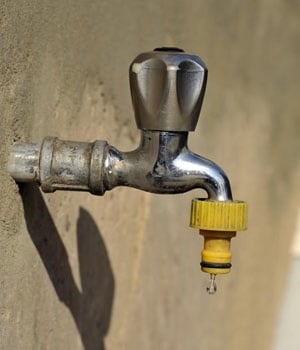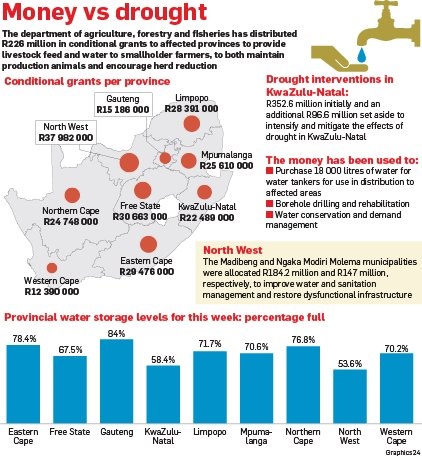
As a crippling drought tightens its grip on the country, South Africa may soon have to turn to alternative water sources, including making acid mine water and sea water drinkable.
Water and Sanitation Minister Nomvula Mokonyane said these options were on the table as the state investigated ways of mitigating the current drought, especially as significant rain is only expected in March 2016.
“We’re looking at the creation of water banks. We want to move away from overreliance on surface water,” said the minister.
While not much has been done regarding desalination, which involves the removal of salt and other minerals from sea water to make it suitable for consumption, there seems to have been some work done on acid mine drainage.
“As we speak, we have three central basins [in Gauteng] – the central, western and eastern basins. The eastern basin is under construction ... We have moved beyond emergency intervention and we are now ready with the implementation,” said Mokonyane.
Also looking into positive use of acid mine drainage was the City of Joburg. Mayor Parks Tau said his municipality had done tests and the results showed a strong possibility of turning acid mine drainage into potable water.
Briefing the media on the state of the drought and water shortage in Pretoria on Friday, the interministerial committee, led by Cooperative Governance and Traditional Affairs Minister Pravin Gordhan, tabled several state interventions aimed at mitigating the effect of the drought. The committee outlined the challenges and efforts carried out by the state to lessen potential effects on the country.
With a combined almost R1 billion set aside by several departments to mitigate severe water shortages experienced recently as demand for water increases, the government said it had embarked on a continuous assessment process to intervene where the situation worsens.
The money will be used to purchase fodder, medicinal supplies, drill boreholes and rehabilitate old ones, fix water infrastructure and help farmers manage their livestock better and avoid serious losses.
One of the hardest-hit provinces, North West, said it needed R2.9 billion to buy fodder, drill new boreholes and purchase medical supplies like supplements for malnourished animals.
The director for rural development coordination in the provincial agricultural department, Ketlile Mabitsela, said 485 000 livestock units were at risk of being directly affected. One livestock unit is one head of cattle or four sheep or goats.
“Our assessment done earlier this year revealed that 2% of this 485 000 have already died and around 15% of it is worthless in terms of quality. They [farmers] need immediate assistance in the next week and if they don’t get it, [their livestock] will perish,” Mabitsela said.
Mokonyane, meanwhile, expressed serious concerns about the continuing wastage of water, especially in urban areas. She said that in Johannesburg, a large amount of water was being wasted in the leafy northern suburbs because of swimming pools and the use of garden sprinklers. Tau said 46% of water supplied for domestic use was going into gardening, and he encouraged residents to change this because the water sources were already under severe pressure.
Mokonyane said the drought was currently “affecting 173 of the country’s 1 628 water schemes serving about 2.7 million households, or 18% of the total national population”.
She said, however, that water levels were not yet at a critical stage. “Regional water supply dams and schemes remain water secure and are sitting with a positive water balance, with the national average dam level currently sitting at 66%.”
Johannesburg was one of the areas where water shortages were experienced this week as demand increased because of a heat wave.
Mike Muller, associate professor at the University of the Witwatersrand’s School of Public and Development Management, said the Lesotho Highlands Water Project, which is supposed to provide South Africa with much-needed water, would not be completed by 2020 as planned.
“It is estimated that it will only be completed in 2024, which means we are facing water shortages between 2018 and 2024,” said Muller.
“This can cripple the economy of Gauteng, as happened when the delay in construction of the Medupi Power Station caused a huge shortage of electricity supply.”
Muller also urged government to come down harder on municipalities that do not monitor their water use.
“Where there are no water meters, it means these municipalities do not know how much water they lose due to leakages and water theft, and municipalities have no way to levy charges for this.”




 Publications
Publications
 Partners
Partners









